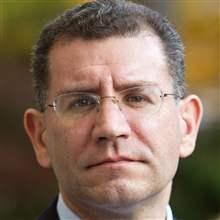A diplomatic gambit to induce Syria to give up its chemical weapons has added a new twist to the intense Washington debate over possible military strikes there. How will the new proposal affect dynamics in Congress as a vote to authorize military force looms? Could the Russian proposal to have Syria turn over chemical weapons to international inspectors revitalize conflict-resolution efforts through the United Nations Security Council? Brookings experts discussed the repercussions for Syria, the Middle East and U.S. foreign policy. This post is an edited version of the conversation among Tamara Cofman Wittes, Michael Doran, Jeremy Shapiro, Bruce Riedel, Fiona Hill, Bruce Jones and Kenneth Pollack.
Join the conversation on Twitter! See a list of Brookings FP scholars on Twitter HERE or follow @BrookingsFP now.
Director, Saban Center for Middle East Policy, Senior Fellow,
Foreign Policy Program
Now that Syria has agreed in principle with the Russian proposal to turn over its chemical weapons stockpiles to international supervision, the U.S. government is in an even bigger pickle. So: how could one make lemonade? Since the threat of force apparently produced a significant new concession, how could the United States sustain the momentum of coercive diplomacy?
a) Is there a way that international supervision over chemical weapons – locating, inspecting, securing, removing, destroying – could be used as a means of slowing/stopping the military conflict in Syria or constraining the Syrian regime’s use of conventional firepower against civilians?
b) Could this Russian proposal be combined with other diplomatic elements to promote a negotiated “solution” to the underlying conflict – that is, could this be leveraged to compel Syrian participation in Geneva II or something like it?
c) Could the Russian proposal be combined with international criminal accountability for the chemical weapons use and other law-of-war violations that would effectively end Bashar al-Assad’s reign? – for example, perhaps the United States could agree to back off of strikes and support a UNSC resolution, if Russia agrees that the resolution refers Assad to the ICC and Syria has to hand him over immediately?
Roger Hertog Senior Fellow,
Foreign Policy Program
, Saban Center for Middle East Policy
This proposal, to my mind, should not be seen as Russia working with the United States toward an outcome that gets rid of Assad. It represents Russia finding a way to let President Obama retreat from the battlefield with honor. If Obama bites, and I suspect he will, this initiative will be wrapped up in process for months, if not years. Assad will repackage bottles of Chanel No. 5 and call them chemical weapons. We will call foul. The Russians will call for more tests on the perfume. The same cat and mouse game that we saw that Saddam Hussein played with UN inspectors with weapons of mass destruction will play itself out in a Syria context. All the while, Russia will back Assad when it really matters.
There are only two ways that this cat and mouse game can be turned to our advantage: (1) While playing games with the Russians, the United States builds a significant coercive strategy to run parallel to the UN process. And (2) the FSA magically turns the tide on the battlefield. Absent either of those, we are in, as Tamara says, a pickle.
Visiting Fellow,
Foreign Policy
Just a few points in response to Tamara’s note:
a) The regime has been looking for a temporary ceasefire for some time. It seems to be their view that a pause in the fighting helps them more than it helps opposition. In part, this is because regime forces have barracks to go to and the opposition doesn’t, in part because regime forces are badly overstretched and can benefit more from time to rest and refit than the opposition. Also, it is in part because there is much that regime forces can do besides fighting rebels (i.e. closing the border, harassing the population, “recruiting”) while they are not having to deal with the insurgency.
b) The Syrian regime is on already board with Geneva II—clearly for cynical reasons and in the expectation that it would never require anything of them, but they have always been willing to attend and have even appointed negotiators. The opposition has not.
c) ICC referral is considered problematic because of the worry that the ICC will use it to take jurisdiction over some Israeli actions (because the Golan is in Syria from the standpoint of international law). It might be possible to construct a referral that would avoid this, but other UNSC members would have to play along in any case.
I think that even though as Mike says, the Russians and the Syrians could and would use a process like this to wrap the US around the axle as in Iraq (the so-called “full Primakov”). I would note the following:
1) Any coercive diplomacy effort that is unwilling to accept surrender is nothing but an excuse for war. Obviously, in this and any other case, surrender is difficult to define and implement verifiably. But it is probably worth the effort because otherwise every threat is simply a prelude to action or an occasion for a humiliating climb down.
2) It is not a small thing to get Assad to admit that he has chemical weapons and to get him to even to commit to give it up to the international community. He has not accepted such responsibility to the international community before. This will be deeply humiliating and will undermine him within his own regime, for what that’s worth.
3) You can’t make lemonade from pickles (trust me, don’t try). But the best path forward in my mind for the administration, is to double down on Sec. Kerry’s statement and to amend the ask to Congress to authorize force if Assad does not relinquish the chemical weapons within seven days. This might help get the authorization through the House, which looks pretty hairy at this point. The Assad regime will assumedly not get this done in seven days, but will play for more time as Mike describes. But at least at that point, Obama will have shored up his Congressional flank.
Jeremy, it is important not to present acceptance of a diplomatic process as a change in the balance of power. It is not. Assad is a master at trading acceptance of process for tangible gains from us. And we are masters at letting him do so while calling our capitulation strategic genius. This, I predict, will be another such episode, of which there are countless examples that I could site.
Having dealt ourselves this hand, I suppose we have to play it out. But we should play it hard. Insist that they sign the convention tomorrow. Make them reveal all of their sites to the UN the day after, etc., etc…If they won’t— and I predict they won’t— then we must assume that we are being played for the suckers that, time and again, we have shown ourselves to be.
As for looking for excuses for war, it is Assad who has been slaughtering people wantonly for two years. And this proposed “surrender” is hardly intended to stop that war. It is merely intended to give the United States a way to step aside so that the slaughter can continue unimpeded.
Notwithstanding the “Shapiro Gambit”— write into the congressional resolution a requirement that Assad give up his chemical weapons in seven days OR ELSE— I think we may well end up back in NY arguing over terms of a resolution to sanctify this “fulll Primakov”. So I ask: what elements should U.S. government demand in a UNSC resolution? Whatever the US can get into a resolution could in the right circumstances provide Chapter VII cover should Syria fail to comply, justifying use of force down the line.
My initial list:
1) Cease-fire and other components of the 2012 Annan Plan (humanitarian access, journalistic access, freedom of assembly and expression, release of detainees). It might be true that a temporary cease fire would help Assad more than the rebels. But the rebels and those supporting them also need time to get their stuff together, and the other Annan Plan provisions (withdrawal of army from population centers, release of detainees) would weaken Assad more than the pause would refresh him, I think.
2)Declaration of Syrian culpability for August chemical weapons attack. Even the Iranians have relented; Syrians are, by accepting this Russian offer, acknowledging that they have chemical weapons and that their chemical weapons capability is a problem. It’s only a baby step from there to Russian acknowledging the likelihood of Syrian regime culpability.
3) Carefully crafted ICC referral restricted to acts undertaken within the context of the internal conflict (to avoid Israeli vulnerability)
I figure you ask for all three and you yield on #3.
Others?
Director,
The Intelligence Project
, Senior Fellow,
Foreign Policy
, Saban Center for Middle East Policy,
Center for 21st Century Security and Intelligence
Since the administration has made the issue chemical weapons, not regime change, it has no choice but to explore Putin’s offer. The only way to destroy safely and completely the chemical arsenal is with Syrian consent. Of course, the Syrians will drag it out and cheat, and the UN – which will get the mandate to do the mission – will prevaricate. Our intelligence on the Syrian chemical weapons arsenal is not going to be able to say definitively how much agent and precursors they have or how many bombs and rockets have been weaponized. It will be lucky to say where all the production sites are. So the Syrians will make a declaration and the UN will have to do inspections (in the middle of a war) to verify it. And that could take years, while the civil war continues with conventional weapons.
Among members of Congress, I imagine there is a lot of anguish over Obama’s decision and a real worry that a “yes” vote would spark a primary challenger from the left, as well as some anger at AIPAC for turning this into a test of loyalty. The bottom line is that there are 240+ “no” votes already in House, well above the 217 needed. A drowning man takes any life raft, even a Russian one.
My only question is why Putin did not offer this in St. Petersburg when he could probably have gotten a majority of the G20 to sign up. I guess they calculated that Kerry would sooner or later open the door.
Director,
Center on the United States and Europe
,Senior Fellow,
Foreign Policy
, The Stephen and Barbara Friedman Senior Fellow
As for Bruce’s question about why not at the G20—it is better to save the offer until you get into the thick of the Senate debate, showing a “bigger bang for the buck” and better dramatic effect to come in at the 12th hour. He already got plenty of mileage and scored plenty of points out of the G20.
Despite the fact that the Shapiro gambit would greatly strengthen the U.S. hand in NY, I suspect that Tamara is right and that both the administration and the Congress will gladly kick that can down the road.
Still, I would have a different approach to the resolution, while acknowledging everyone’s point that any inspections regime is a long, complicated and nightmarish road. I don’t think we should re-open the same old arguments over the Annan plan—the Russians and the regime have long since learned how to game those provisions and they are so 2012 anyway. And why argue about culpability if we can get the chemical weapons out—the eventual case against Assad for war crimes is looking really solid regardless of chemical weapons Let’s focus on the two areas that Russians have indicated they want to work and on which we have some credibility: humanitarian and chemical weapons disposal.
1) Get the UNSC to authorize UN humanitarian ops in the Syria without Syrian regime approval (not just a guarantee of access but actually moving ahead without approval of specific operations, NGOs etc.). If we want to help Syrians, this is the best thing we could to do. It would open the liberated areas of the North especially to large-scale humanitarian relief finally and might end up creating de facto safe zones. The Russians may agree, they have often talked about the need to improve the humanitarian situation in Syria; the Syrian regime would be furious. In the end, this might alter the balance more than cruise missile strikes.
2) As much detail as possible on the chemical weapons eradication operation to include some date certain, inspection etc. I think a key question will be how to do this in the middle of a civil war in a way that keeps the weapons and inspectors or monitors safe through local ceasefires, UN protectors, etc. Frankly, this may be an insoluble problem, but we could at least profit from it to form a coordination body between the FSA and Syria military under UN chairmanship to coordinate and protect movements of weapons and material. Getting contacts between the Syrian military and the FSA at that level could be useful later.
3) Sanctions— we should put into place a system of prospective sanctions if the regime is found in violation. Oddly, the U.S. Treasury’s financial sanctions are the most underutilized and underappreciated asset in the struggle against Assad. If we could put in place a UN financial sanctions regime, we would (for complicated reasons) unleash the awesome power of the U.S. Treasury’s much feared Green Shade Brigade. It is a long shot to get to implementation on these, but once again if we can use UN sanctions to finally cut off Syrian access to international financial system, we will have done much more harm to the Syrian war machine than through cruise missiles or even much larger air strikes.
4) The big fight will be over Chapter VI vs. VII, but in the end it doesn’t matter much if the administration is backing this up through the unilateral threat of force. Under any circumstances, to use force we will have to come back to the UNSC and get approval from the Russians and Chinese or go ahead without UNSC approval. At that stage, I don’t think it matters much whether an earlier resolution referenced Ch7 —the legitimacy or lack thereof of later actions will come from other quarters. I would open negotiations with Chapter VII but settle for Chapter VI if we can get (1), (2), and (3). The Russians will go home thrilled that they have stymied us in our usual effort to get Chapter VII cover for later actions and perhaps will not notice (or care) that they have weakened the Syrian government considerably.
5) I’m not sure the ICC is a good bargaining chip. Beyond the Israel complication, why do we want it? What if the Russians accept it and the ICC in its infinite wisdom starts opening cases against opposition commanders with a history of eating livers or executing prisoners on YouTube? There are a lot of war crimes in Syria. The ICC will never add moral clarity to Syria until one side is victorious and probably not even then. (My motto on this is “No Victor’s Justice until Victory”). In the end, we won’t be able to talk to some opposition commanders and Assad will just go merrily on his way like Basher in Sudan.
It is important to note that in Iraq UN inspections worked. UNSCOM and IAEA inspectors destroyed far more of Saddam’s arsenal than allied military strikes. The inspectors also discovered the Iraqi arsenal was bigger and more dangerous than U.S. intelligence believed. The effort took years to do its work and required frequent applications of U.S. and U.K. military power to succeed. The UNSC provided a clear and comprehensive mandate that did not include regime change.
I always thought that it was intriguing that the Iraqi inspections worked for the weapons of mass destruction, but not for the political problem that the United States actually had. That became defined over the course of the 1990s as the presence of the Iraqi regime. Similarly, these inspections have a prayer of working on their own terms (although the presence of an actual civil war makes it even harder than Iraq), but whether they solve our political problem is a separate question.
In recent days, Obama has moved the debate away from regime change and his “Assad must go” declaration toward the more narrowly-defined chemical weapons problem. If he can hold that line in U.S. domestic politics and get a chemical weapons-focused UNSCR, then the inspections conceivably could work for the chemical weapons problem and thus for Obama’s political problem. But of course, as has been widely noted, chemical weapons don’t really have much to do with the larger problems in Syria, so the war and suffering there will continue and events may conspire to bring the regime change issue back into U.S. domestic politics.
Director,
Managing Global Order
, Senior Fellow,
Foreign Policy
To Jeremy’s point: I don’t think it will be that hard to get Chapter VII. But the French will introduce language of automaticity – i.e. if the proposal fails (which it must do) then the UNSC is pre-approved for enforcement action. The Russians will fight this hard. That’s where the diplomatic game will be in New York now. The UN chemical weapons inspectors report will come in one week and looks to be hard for Assad defenders to handle.
 Kenneth M. Pollack
Kenneth M. Pollack
Senior Fellow, Foreign Policy, Saban Center for Middle East Policy
I see both Bruce Riedel and Jeremy’s points as key.
The inspections DID work–and worked where bombing (by the United States and Israel) failed. But even then Saddam disarmed only in stages, and the last stage was probably not until sometime in 1995-97. Perhaps Bashar will be smarter than Saddam and give up completely much sooner.
But as Jeremy rightly points out, doing this in the midst of a civil war makes this completely different–and much harder than Iraq. I think it a mistake to think you can carry out business-as-usual inspections in the midst of a civil war. The civil war will constantly affect the inspections, and probably in ways we can’t foresee right now.
Moreover, we also need to remember that even after Saddam gave up his weapons of mass destruction, he tried to preserve the fiction that he still had them as a deterrent against a Shi’a rising–i.e., exactly the threat that is now Bashar’s reality. He too must worry that the opposition will be both heartened and emboldened if he is forced to give up his chemical weapons–and his own folks might be demoralized or lose confidence in his leadership.
This is going to be very hard.
It’s going to be very hard moving asymptotically close to impossible. Don’t forget: we actually were committed to stripping Saddam of his weapons of mass destruction. Obama wants to strip Assad of chemical weapons the way that I want to lose weight. Am I committed? Yes. Do I believe it’s the right thing to do? Yes. Am I going to give up that piece of chocolate cake? Well….
Putin and Assad know that Obama wants Syria to just go away. He is being pushed into involvement against his fundamental political impulses. They are providing him with a palliative: “Hey, Barack, this chocolate cake is GLUTEN FREE.” Obama has a political interest in not getting too wrapped up in the details of implementation. And as Christopher Dickey said this morning, the devil will exploit the details. If Obama balks at the details, he then has to carry out a strike or, worse, actually develop a Syria policy. He doesn’t want to do either, so he will willingly participate in the charade.
Anyone who believes the Kerry-Lavrov plan – or Obama-Putin plan, or Putin gambit, or whatever we’re supposed to be calling it – to tackle Syria’s chemical weapons capacity is an easy exit to this crisis is kidding themselves, or trying to kid us. But it might – might – change the diplomatic dynamics.
First, the practicalities. This is not a matter of sending in a couple of inspection teams. To verify let alone dismantle and transfer Syria’s chemical arsenal, as it’s estimated and reported, would take hundreds of inspectors, deployed across the country. They would have to be given strong guarantees, but no one would trust those unless the inspectors were backed up by a strong international security presence to look after their safety and facilitate their access. After all, when the UN sent a small chemical weapons inspection team to Syria in August, they were shot at. In the context of a stable situation with reliable parties and a cooperative – or compliant – government, this would be hard, but feasible. In the context of a hot war, and with distrustful parties on the ground, it’s nigh-on impossible.
Second, the politics. There are two scenarios here – and one puts the Russians in a bind. If the western powers at the UN treat the Russian support for this proposal with a large dollop of skepticism, they’ll stick firmly to the lessons they learned in the 2003 debates over inspections and enforcement in Iraq. That is, they’ll set out clear conditions for implementation of the proposal, and set out tough enforcement measures under Chapter VII of the UN Charter if the implementation stalls. At this, the Russians will balk. But if the West is firm, that leaves Russia with two unpalatable choices: back a genuine, serious disarmament process backed by an international security presence – and a necessary cessation of hostilities – that they would then be on hock to deliver; or block their own proposal in the Security Council, which would leave them looking spectacularly disingenuous and strengthen the hand of those who want action against Assad. Bear in mind that in the coming days, as well, the UN’s existing chemical weapons inspection team will share their data with the UN Secretary-General, and given how clear both the western intelligence is and how strong reports by independent actors like Human Rights Watch are, it’s a reasonable bet that the UN report will make build not weaken the case against the Assad regime. The EU, for example, has said there should be no military action before the UN report – but they certainly haven’t ruled out support for it after it.
Third, the pessimism. There is, of course, another scenario. It is that everyone desperately grabs for this vague glimmer of light here, to avoid confronting the darkening mess that they were in diplomatically and politically. They turn a half a blind eye to the unrealism of the disarmament proposal, and sign off on a resolution that can’t be implemented and can’t be enforced. Then we’re into a “deck chairs on the Titantic” scenario.
All of this, and all we’re talking about so far is the chemical weapons issue. There’s nothing in the debate right now that tells us where we’re going on the broader question of the Syrian crisis. There’s a “fantasy world” scenario where the necessary conditions for inspection are actually put in place and we end up with both an outcome on the chemical weapons and the crisis itself – but the odds of that are fractional. In the land of the realistic, the issue at stake here is how the UNSC and the UN chemical weapons team report alters the diplomatic landscape. Pace much of today’s commentary, Russia’s hand is weaker than it looks.

 Michael Doran
Michael Doran Bruce Riedel
Bruce Riedel Fiona Hill
Fiona Hill Bruce Jones
Bruce Jones


Commentary
Around the Halls: Syria, Chemical Weapons and the U.S.—Debating the Proposal From Russia
September 10, 2013